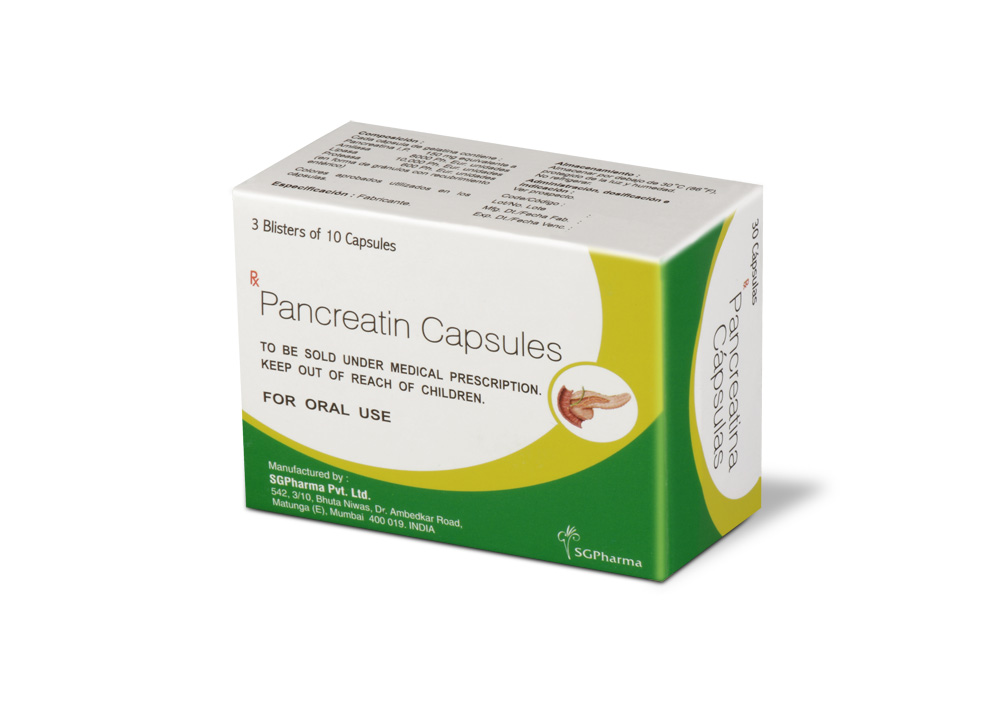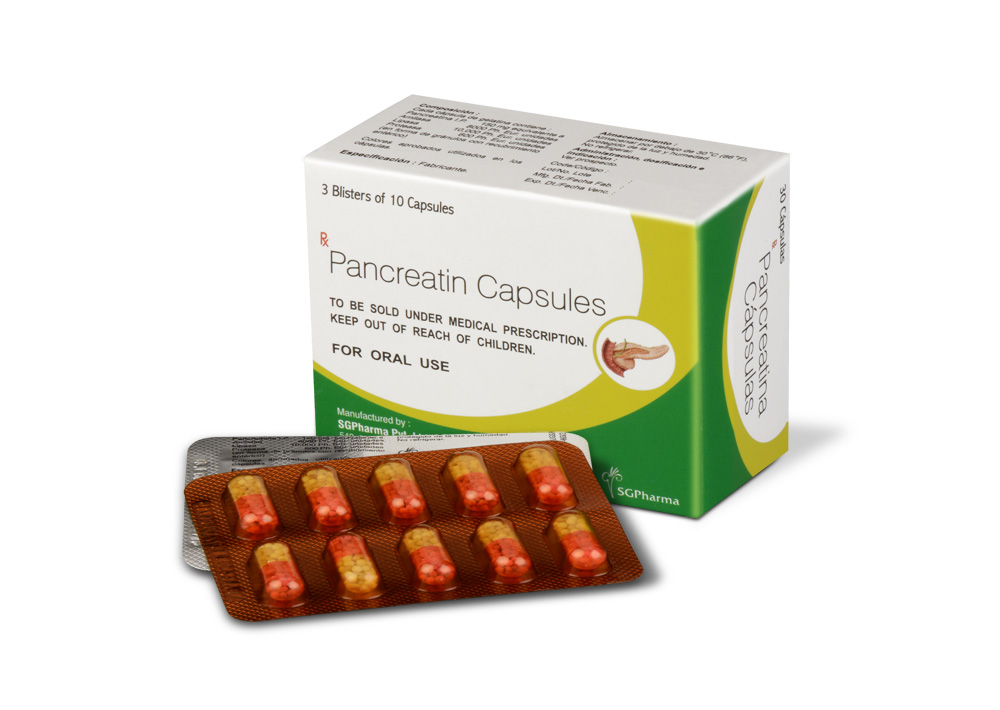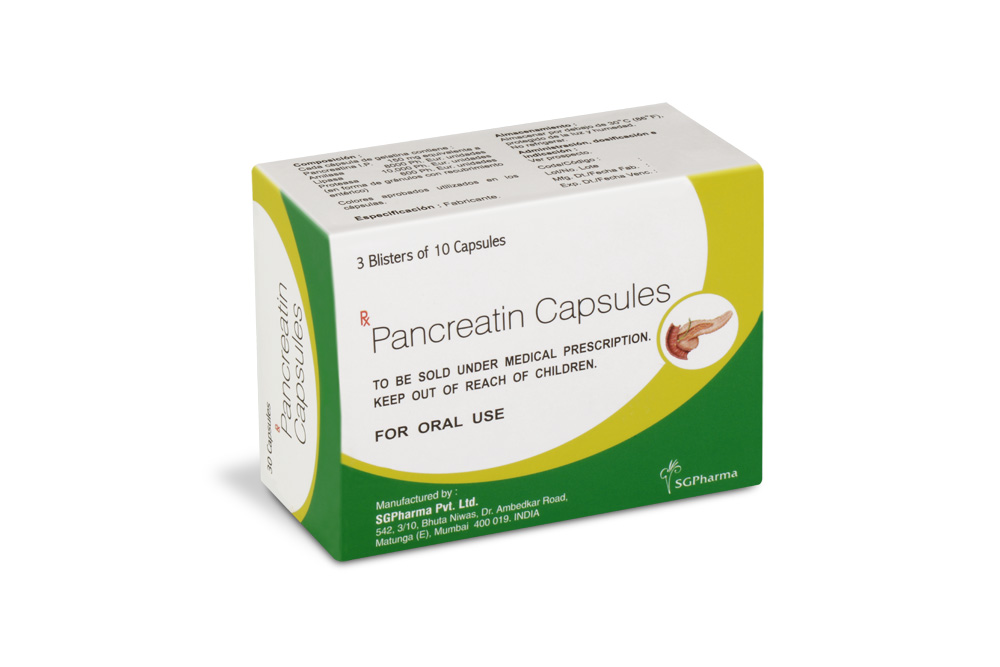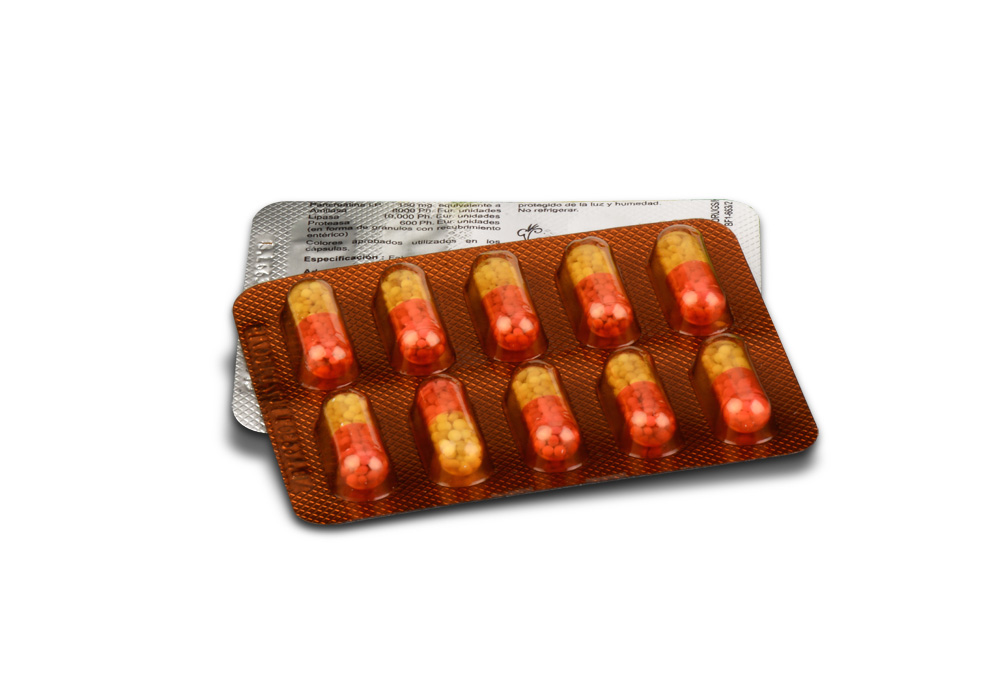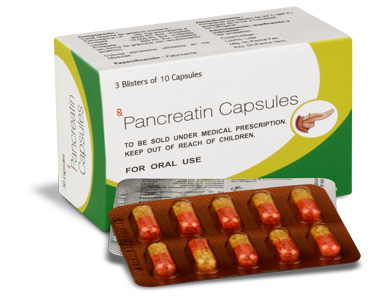
10,000 IU
For the use of a Registered Medical Practitioner or a Hospital or a Institution only.
PANCREATIN CAPSULES (Pancreatin) beads are porcine pancreatic enzyme preparations containing pancreatic extract encapsulated in enteric-coated granules with a pH-sensitive coating.
PANCREATIN CAPSULES contains off white coloured spherical beads filled in hard gelatin capsule of suitable size.
COMPOSITION :
Each hard gelatin capsule contains :
Pancreatin I.P. 150 mg equivalent to
Amylase 8000 Ph. Eur. units
Lipase 10,000 Ph. Eur. units
Protease 600 Ph. Eur. units
(as enteric coated granules)
Approved colours used in empty capsule shells.
ACTIONS :
PANCREATIN CAPSULES contains porcine pancreatin formulated as enteric-coated (acid-resistant) granules within gelatin capsules. The capsules dissolve rapidly in the stomach releasing plenty of granules, a multidose principle which is designed to achieve good mixing with the chyme, emptying from the stomach together with the chyme and after release, good distribution of enzymes within the chyme. When the granules reach the small intestine the coating rapidly disintegrates (at pH > 5.5) to release enzymes with lipolytic, amylolytic and proteolytic activity to ensure the digestion of fats, starches and proteins. The products of pancreatic digestion are then either absorbed directly, or following further hydrolysis by intestinal enzymes. Pancreatic enzymes (as pancreatin) hydrolyse fats to
glycerol and fatty acids, break down protein into peptides, proteoses and derived substances, and convert starch into dextrins and sugars.
PHARMACOKINETICS :
Animal studies showed no evidence for absorption of intact enzymes and therefore classical pharmacokinetic studies have not been performed. Pancreatic enzyme supplements do not require absorption to exert their effects. On the contrary, their full therapeutic activity is exerted from within the lumen of the gastrointestinal tract. Furthermore, they are proteins, and as such undergo proteolytic digestion while passing along the gastrointestinal tract before being absorbed as peptides and amino acids. Pharmacokinetic data are not available as the enzymes act locally in the gastro-intestinal tract. After exerting their action, the enzymes are digested themselves in the intestine.
INDICATIONS :
PANCREATIN CAPSULES are used for treatment of conditions associated with pancreatic exocrine insufficiency, such as : cystic fibrosis, chronic pancreatitis, post-pancreatectomy, post-gastrointestinal bypass surgery, e.g. Billroth II, gastroenterostomy; ductal obstruction of the pancreas or common bile duct (e.g. from neoplasm).
Administration :
PANCREATIN CAPSULES are for oral administration.
Mode of Administration :
PANCREATIN CAPSULES should be swallowed intact, without crushing or chewing, with enough fluid during or after each meal or snack. When swallowing of capsules is difficult (e.g. small children or elderly patients), the capsules may be carefully opened and the granules added to acidic soft food [pH < 5.5] that does not require chewing, or the granules will be taken with acidic liquid [pH < 5.5]. This could be apple sauce or yogurt or fruit juice with a pH less than 5.5, e.g. apple, orange or pineapple juice. This mixture should not be stored. Crushing and chewing of the granules or mixing with food or fluid with a pH greater than 5.5 can disrupt the protective enteric coating. This can result in early release of enzymes in the oral cavity and may lead to reduced efficacy and irritation of the mucous membranes. Care should be taken that no product is retained in the mouth.
Dosage :
Adults (including the elderly) and children :
Initially one or two capsules with each meal. Dose increases, if required, should be added slowly, with careful monitoring of response and symptomatology. It is important to ensure adequate hydration of patients at all times whilst dosing PANCREATIN CAPSULES.
CONTRAINDICATIONS :
Hypersensitivity to pancreatin of porcine origin or to any of the excipients in PANCREATIN CAPSULES.
WARNINGS AND PRECAUTIONS :
Strictures of the ileo-caecum and large bowel (fibrosing colonopathy) have been reported in patients with cystic fibrosis taking high doses of pancreatin preparations. As a precaution, unusual abdominal symptoms or changes in abdominal symptoms should be medically assessed to exclude the possibility of fibrosing colonopathy, especially if the patient is taking in excess of 10,000 units of lipase/kg/day. As with all currently marketed porcine pancreatin products, PANCREATIN CAPSULES are sourced from pancreatic tissue from swine used for food consumption. Although the risk that PANCREATIN CAPSULES will transmit an infectious agent to humans has been reduced by the testing and inactivation of certain viruses during manufacturing, there is a theoretical risk for transmission of viral disease, including diseases caused by novel or unidentified viruses. The presence of porcine viruses that might infect humans cannot be definitely excluded. However, no cases of transmission of an infectious illness associated with the use of porcine pancreatic extracts have been reported, whereas they have been used for a long time. Patients being treated for pancreatic insufficiency should be monitored for folate status or given folic acid supplementation.
Pregnancy :

 Cardiovascular
Cardiovascular



